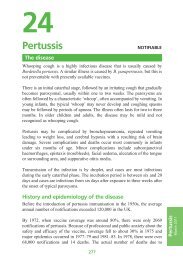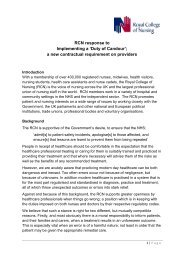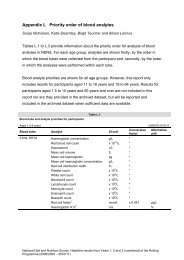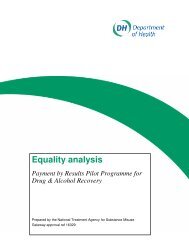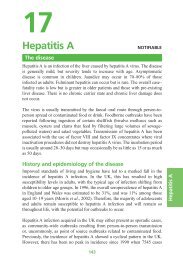No decision about me, without me - Department of Health
No decision about me, without me - Department of Health
No decision about me, without me - Department of Health
Create successful ePaper yourself
Turn your PDF publications into a flip-book with our unique Google optimized e-Paper software.
3.11 Concerns were raised <strong>about</strong> the ability <strong>of</strong> so<strong>me</strong> GPs and other clinical staff to<br />
adequately manage the needs <strong>of</strong> patients with conditions that affect their <strong>me</strong>ntal<br />
capacity, such as de<strong>me</strong>ntia or learning disabilities.<br />
“For patients who lack capacity, the views <strong>of</strong> carers and other interested<br />
parties must be collated in order to make a best-interests shared <strong>decision</strong>. All<br />
principles in relation to Mental Capacity Act legislation should be adhered to in<br />
the process.” [The Royal College <strong>of</strong> Psychiatrists]<br />
3.12 The Mental Capacity Act 2005 is a vital piece <strong>of</strong> legislation underpinning the<br />
NHS that requires all health pr<strong>of</strong>essionals to take 'all practicable steps' to help<br />
people make their own <strong>decision</strong>s, even where they have a <strong>me</strong>ntal impair<strong>me</strong>nt.<br />
Just because a patient has a <strong>me</strong>ntal impair<strong>me</strong>nt does not <strong>me</strong>an that those patients<br />
and their carers should not be involved in <strong>decision</strong>s <strong>about</strong> their care. Options<br />
may need to be communicated in different, or more appropriate ways and<br />
patients need to be supported in understanding the options and their<br />
implications, as well as being assisted in making and communicating their<br />
choices. The principles <strong>of</strong> the Mental Capacity Act must be adhered to in any<br />
<strong>decision</strong> making where a patient lacks capacity or their capacity is predicted to<br />
deteriorate over ti<strong>me</strong>.<br />
3.13 In cases where people’s capacity is predicted to deteriorate over ti<strong>me</strong>, for<br />
example if they are diagnosed with early stage de<strong>me</strong>ntia, personalised care<br />
plans would be a useful way to enable them to plan how they would like their<br />
health needs <strong>me</strong>t when they lose capacity. They will also be an important tool to<br />
help those who have fluctuating capacity retain more control when they beco<strong>me</strong><br />
unwell. When planning care with people who lack <strong>me</strong>ntal capacity, it is<br />
important that the person be supported to have the fullest input possible into<br />
<strong>decision</strong>s affecting them. Their family, carers and representatives should also<br />
be fully involved in developing the plans for the future.<br />
Children and young people<br />
3.14 Other people responded specifically to highlight that involve<strong>me</strong>nt <strong>of</strong> children<br />
and young people in <strong>decision</strong>s <strong>about</strong> their care and treat<strong>me</strong>nt was not<br />
appropriately recognised in the consultation docu<strong>me</strong>nt:<br />
“Children and young people want to engage in shared <strong>decision</strong> making and<br />
govern<strong>me</strong>nt should consider the barriers they experience to achieving this,<br />
alongside good practice, and children and young people’s own suggestions for<br />
improve<strong>me</strong>nts.” [National Children’s Bureau and the Council for Disabled<br />
Children]<br />
17




